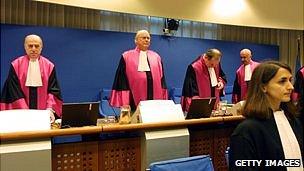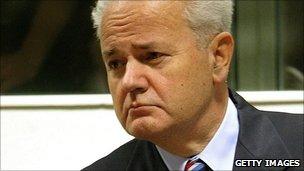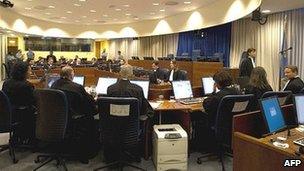At a glance: Hague tribunal
- Published

There is now an end in sight to the work of the ICTY judges
The last two men still wanted by the International Criminal Tribunal for the former Yugoslavia (ICTY) in The Hague have finally been captured in Serbia.
Former Bosnian Serb army chief Ratko Mladic was arrested in May 2011 and is at The Hague, facing trial. The former Croatian Serb leader Goran Hadzic was arrested in July and is expected to be transferred to the ICTY soon.
The UN body was set up to prosecute serious crimes committed during the wars in the former Yugoslavia.
Tribunal's record
Since the tribunal was established in 1993, it has indicted 161 people and concluded action against 126 of them:
64 have been sentenced
13 have been acquitted
13 have had their cases referred to national jurisdiction
36 have had their indictments withdrawn or have died
The death of former Yugoslav President Slobodan Milosevic in March 2006 was a blow to prosecutors, who regarded him as the man ultimately responsible for the bloodshed that ripped Yugoslavia apart.
Mr Milosevic died of a heart attack in the tribunal's detention unit while on trial facing charges of war crimes and crimes against humanity for his alleged central role in the wars in Bosnia, Croatia and Kosovo during the 1990s.

Slobodan Milosevic was found dead in his cell
He also faced genocide charges over the 1992-95 Bosnia war, in which 100,000 people died.
Another disappointment for prosecutors was the acquittal of former Kosovo Albanian Prime Minister Ramush Haradinaj, a former commander of the Kosovo Liberation Army.
A judge at Mr Haradinaj's acquittal ruled that much of the evidence against Mr Haradinaj was either inconclusive or non-existent.
Ongoing proceedings
The tribunal has ongoing proceedings against 35 individuals:
14 are currently on trial - including former Bosnian Serb leader Radovan Karadzic, detained by the Serbian authorities on 21 July 2008 after evading capture for 13 years.
16 are before the Appeals Chamber
4 are at the pre-trial stage
1 is being held in Serbia and facing extradition proceedings - former Croatian Serb leader Goran Hadzic
The latest indictee to be transferred to The Hague was Ratko Mladic, former chief of staff of the Bosnian Serb army, who was arrested on 26 May 2011. He faces charges over the massacre of at least 7,500 Bosnian Muslim men and boys at Srebrenica in 1995.
In April 2011, the tribunal sentenced two retired Croatian generals, Ante Gotovina and Mladen Markac, to 24 and 18 years in jail respectively for crimes against Serbs including murder, persecution and plunder.
Higher tariffs imposed by the tribunal have included life imprisonment for former Bosnian Serb General Stanislav Galic; 40 years, on appeal, for former Bosnian Serb mayor Milomir Stakic; and 40 years for Bosnian Serb prison camp guard Goran Jelisic.
Tribunal's mandate
The tribunal was the first international body for the prosecution of war crimes since the Nuremberg and Tokyo trials held in the aftermath of World War II.
The ICTY was established by Resolution 827 of the UN Security Council in May 1993 and all UN members are obliged to co-operate fully with it.
It has jurisdiction over individuals responsible for war crimes committed in the territory of the former Yugoslavia since 1991.
The offences are defined as:
Grave breaches of the 1949 Geneva Conventions
Violations of the laws or customs of war
Genocide
Crimes against humanity
The tribunal may not try suspects in absentia, nor impose the death penalty.
The maximum sentence it can hand down is life imprisonment.
The tribunal has 988 staff members from 82 countries and the budget for 2010-2011 is $302m (214m euros; £185m).
It has teams of investigators working across the former Yugoslavia but it does not have its own police force and instead relies on the former Yugoslav republics or international peace forces to make arrests.
The tribunal has concurrent jurisdiction with national courts over war crimes committed in the former Yugoslavia.
However, it can claim primacy over national courts and may take over national investigations and proceedings at any stage if this proves to be in the interest of international justice.
The tribunal is expected to wrap up its work in the next few years, with most of the cases in the trial or pre-trial stage expected to conclude in 2011 or 2012.
The case of former Bosnian Serb leader Radovan Karadzic is expected to finish at the end of 2013. All appeals are scheduled to be completed by the end of 2014.
However, the recent capture of Gen Mladic and Mr Hadzic could push back the closure of the tribunal.
Structure

The tribunal has heard from 6,000 witnesses
President: Patrick Lipton Robinson (Jamaica)
Vice-president: Judge O-Gon Kwon (South Korea)
There are 14 other permanent judges from various countries.
There are also up to 12 temporary judges.
Chief Prosecutor: Serge Brammertz (Belgium)
Mr Brammertz is the fourth person to hold the position. He took over from Swiss lawyer Carla Del Ponte in January 2008. The position has also been held by Canadian Louise Arbor and the South African Richard Goldstone.
On assuming his post, Mr Brammertz said that his priority would be to ensure that the "four fugitives" - suspects Radovan Karadzic, Ratko Mladic, Stojan Zupljanin and Goran Hadzic - were brought to justice.
Mr Karadzic and Mr Zupljanin are now on trial; Gen Mladic is in pre-trial detention; and, with the capture of Mr Hadzic, he may now be close to achieving that goal.